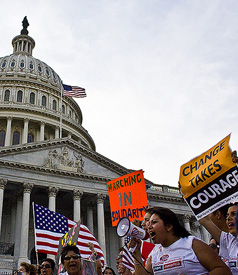Truthout is an indispensable resource for activists, movement leaders and workers everywhere. Please make this work possible with a quick donation.
Tens of thousands of people took to the streets of Washington, DC, on Sunday to pressure President Obama to work toward reforming the nation’s immigration system and giving legal status to the estimated 12 million undocumented people currently living in the United States.
The crowd of immigration activists and immigrants of many different backgrounds and ages filled the five large blocks of the Washington Mall, flying American flags and chanting “Si, se puede,” Obama’s campaign slogan of “Yes, we can” in Spanish, and “Out of the shadows, Into the streets.” They arrived from all over the country, most in buses organized by unions, community organizations and political advocacy groups – among the marchers were undocumented students from Chicago, workers from a meat-packing plant in Tar Heel, North Carolina and an orchestra from New York City with a repertoire of protest songs.
“Every day without reform is a day when 12 million hard-working immigrants must live in the shadow of fear,” Rep. Nydia M. Velázquez (D-New York), chairwoman of the Congressional Hispanic Caucus, told the rally. “Don’t forget that in the last presidential election 10 million Hispanics came out to vote,” she said, and that the crowd must tell lawmakers “that you will not forget which side of this debate they stood on.”
Obama delivered a video message that was broadcast on huge screens around the Mall. He said he would continue working on the issue, but did not mention a specific time frame. “I have always pledged to be your partner as we work to fix our broken immigration system, and that’s a commitment that I reaffirm today.” However, he went on to say, “you know as well as I do that this won’t be easy, and it won’t happen overnight.”
Rep. Luis Guiterrez (D-Illinois), who was the main sponsor of an immigration reform proposal in the House, said he was optimistic about Obama’s push toward an immigration bill this year. “I see a new focus on the part of this president,” Guiterrez said. “That’s why we are here to say we are not invisible.”
For James Hong, the civic participation coordinator for the Minkwon Center for Community Action in Flushing, New York, coming to march Sunday was about bringing a very specific group of people out of the shadows – the one in five undocumented immigrants that are Asian.
“They are not out there politically, nor are they in terms of the media coverage,” he said. His hope is that this march will help them “be recognized for their part in the American dream.”
As a representative of one of the United Food and Commercial Worker Union, one of the first to speak up about Immigration and Customs Enforcement raids on workplaces, Tracey Richardson said that she flew in from Los Angeles with Jackie Gitmed, a worker, to march on behalf of their colleagues whose immigration status kept them from making it to DC.
“It is not only [a matter of] immigration reform, but human rights,” said Gitmed.
The rally was the first major mass street action for immigration reform since protests by hundreds of thousands in 2006, followed by failure in Congress to push through an immigration overhaul in 2007, led to an increase in immigration enforcement raids and widespread fear in the immigrant community.
Many religious leaders present at the event compared the fight for immigration to the civil rights movement. “The angst and trepidation in our communities is unprecedented,” said Rev. Samuel Rodriguez, the leader of the National Hispanic Christian Leadership Conference. “This is our Selma.”
A number of prominent African-American leaders also spoke at the event: the Rev. Jesse Jackson; Benjamin T. Jealous, president of the NAACP; Cornel West, a Princeton scholar; and Marc H. Morial, a former mayor of New Orleans and the president of the National Urban League.
Up the hill from the assembled marchers, negotiations on the health care bill were being concluded.
For Mario Cardenas, an undocumented immigrant rights activist from Chicago, who has been in America since the age of eight, the fate of the health care bill does not inspire him with much hope for immigration legislation.
“The healthcare bill reflects the weakness of social movements in this country, not only because it bans [undocumented] immigrants from healthcare but because it took a year to pass … and it is so far removed from what it was originally supposed to be,” he said. For Cardenas, there is only one way forward. “As an activist, my role here is to build those social movements. I’m inclined to believe that actual change, like legalization for all or humane treatments towards immigrants comes from below, not from legislators or lawmakers.”
A terrifying moment. We appeal for your support.
In the last weeks, we have witnessed an authoritarian assault on communities in Minnesota and across the nation.
The need for truthful, grassroots reporting is urgent at this cataclysmic historical moment. Yet, Trump-aligned billionaires and other allies have taken over many legacy media outlets — the culmination of a decades-long campaign to place control of the narrative into the hands of the political right.
We refuse to let Trump’s blatant propaganda machine go unchecked. Untethered to corporate ownership or advertisers, Truthout remains fearless in our reporting and our determination to use journalism as a tool for justice.
But we need your help just to fund our basic expenses. Over 80 percent of Truthout’s funding comes from small individual donations from our community of readers, and over a third of our total budget is supported by recurring monthly donors.
Truthout has launched a fundraiser to add 379 new monthly donors in the next 6 days. Whether you can make a small monthly donation or a larger one-time gift, Truthout only works with your support.
